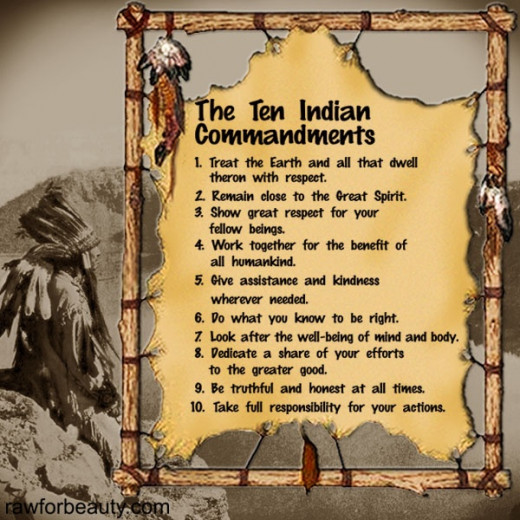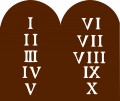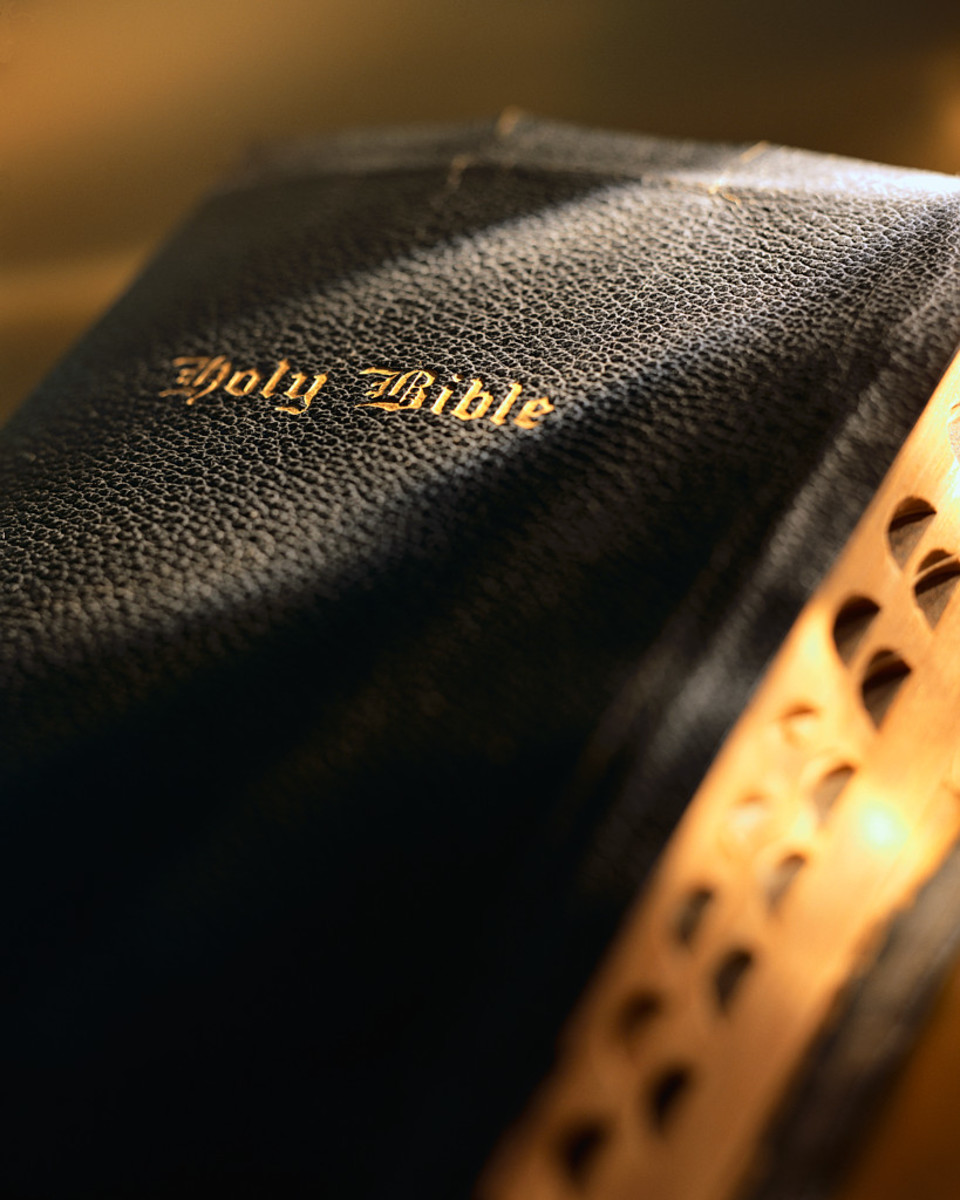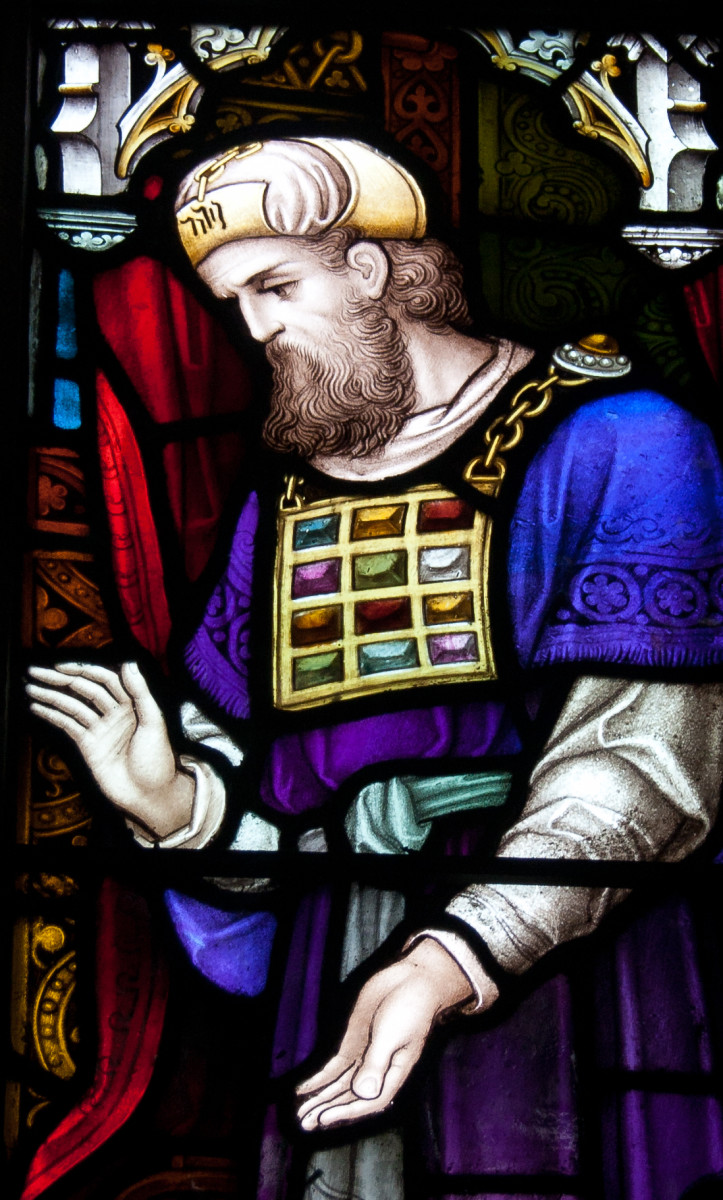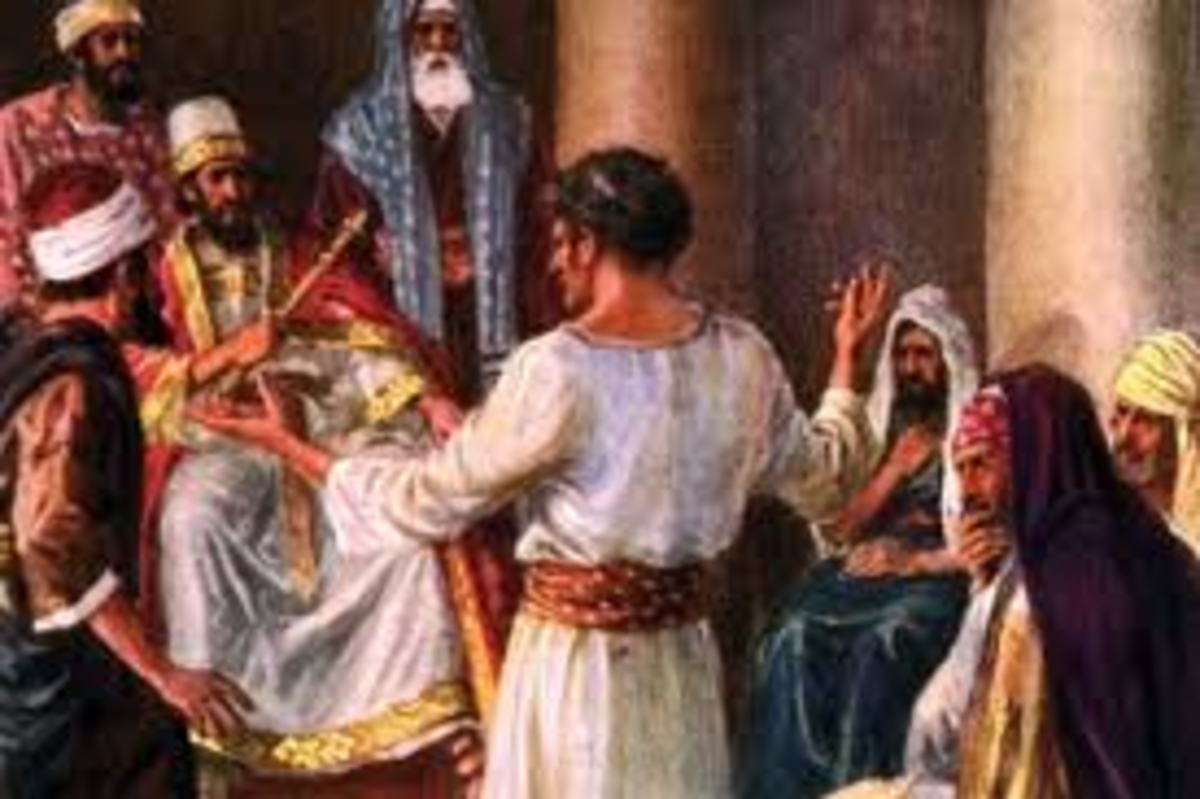Why are there TWO sets of Ten Commandments in the Bible?
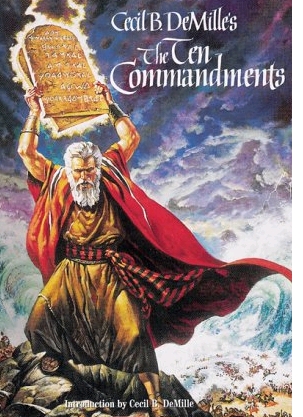
Sorry, but we need to have this discussion
Not only are there two versions of the hallowed Commandments, but the fact is they are simply not all that great. Some of them are good principles, but overall, people don't, or can't, use them as guides to live by.
Also, because these commandments are divinely inspired, written by the finger of God, they should withstand the test of time. And they should not leave things open so that people can make exceptions to their rule (such as, "Remember the sabbath day, to keep it holy" except for the Super Bowl and Little League Baseball).
Join me as we peruse the Good Book for a moment.
Note: my Bible quotes will mostly come from the New International Version. If you prefer to read from a different version of the Bible, you can find any verse from whichever version at the truly excellent site http://biblegateway.com/.
Moses Broke the Tablets
Exodus 32:15-16, 19 -- 15 Moses turned and went down the mountain with the two tablets of the Testimony in his hands. They were inscribed on both sides, front and back. 16 The tablets were the work of God; the writing was the writing of God, engraved on the tablets.
19 When Moses approached the camp and saw the calf and the dancing, his anger burned and he threw the tablets out of his hands, breaking them to pieces at the foot of the mountain.
Moses, out of anger, threw God's work to the ground and smashed it to pieces? This is unbelievable! If you, personally, witnessed God – THE God – chisel tablets out of stone with the express direction to bring them to the people to serve as guideposts for the remainder of humanity, would you smash them in a fit of rage?
"I have seen these people and they are a stiff-necked people. Now leave me alone so that my anger may burn against them and that I may destroy them." - The Lord
Moses AND God Need Anger Management Classes
One could say that Moses needed anger management classes. Then again, just before Moses had HIS nutty, he had to talk God out of throwing his own temper tantrum.
Exodus 32:9-12, 14
9 "I have seen these people," the LORD said to Moses, "and they are a stiff-necked people. 10 Now leave me alone so that my anger may burn against them and that I may destroy them. Then I will make you into a great nation."
11 But Moses sought the favor of the LORD his God. "O LORD," he said, "why should your anger burn against your people, whom you brought out of Egypt with great power and a mighty hand? 12 Why should the Egyptians say, 'It was with evil intent that he brought them out, to kill them in the mountains and to wipe them off the face of the earth'? Turn from your fierce anger; relent and do not bring disaster on your people.
14 Then the LORD relented and did not bring on his people the disaster he had threatened.
By the way, I’m calling God a He purely out of convenience. I should probably write He/She/It because no one really knows for sure who or what God is, but that would look silly after a while.
Even as a child in Sunday school, this seemed a little strange that our almighty, all-knowing, all-loving and imminently powerful God needed to be talked out of destroying all these people -- HIS people (as Moses said). And not only that, but He actually listened to the reason as though He actually really, truly did not already know what would happen to these people throughout all of time, let alone the next few days. This was just one of the many confusing things about religion that I was told not to question because to question and get into logic and reason and semantics was the work of the devil.
Let's make sure this is clear so far:
In Exodus 32, starting at verse 9, Moses talked God out of destroying his people. Shortly after than, starting in verse 15, Moses went down the mountain and got angry when he saw what his people were doing.
So Moses threw a fit and broke the original tablets. After he calmed down, God told him to go back up the mountain so He could make new tablets that had the SAME WORDS as those Moses had broken.
Exodus 34:1 The LORD said to Moses, "Chisel out two stone tablets like the first ones, and I will write on them the words that were on the first tablets, which you broke."
(1) Do not worship any other god, for the LORD, whose name is Jealous, is a jealous God.
(2) Do not make cast idols.
(3) Celebrate the Feast of Unleavened Bread.
(4) The first offspring of every womb belongs to me...
The FINAL (Second) Set of Ten Commandments
And so...
Exodus 34:4 And he hewed two tables of stone like unto the first; and Moses rose up early in the morning, and went up unto mount Sinai, as the Lord had commanded him, and took in his hand the two tables of stone.
[NOTE: My comments are in brackets. I was confused, historically, with some items in the verses, so I read and added information that was worthwhile to my understanding - and hopefully yours. Feel free to research and correct me in the comments section below.]
It's not entirely clear what this second set of commandments is supposed to be. I made educated guesses as to what the ten were intended to be, but there are more than ten as you'll soon read. God kind of talks with Moses, gives some direction (detailed below), and...
Exodus 34:27 Then the LORD said to Moses, "Write down these words, for in accordance with these words I have made a covenant with you and with Israel." 28 Moses was there with the LORD forty days and forty nights without eating bread or drinking water. And he wrote on the tablets the words of the covenant—the Ten Commandments.
So, what did God say to Moses?
Exodus 34:11 Obey what I command you today. I will drive out before you the Amorites, Canaanites, Hittites, Perizzites, Hivites and Jebusites. 12 Be careful not to make a treaty with those who live in the land where you are going, or they will be a snare among you. 13 Break down their altars, smash their sacred stones [or "pillars" representing male fertility] and cut down their Asherah poles [that is, symbols of the goddess Asherah]. 14 (1) Do not worship any other god, for the LORD, whose name is Jealous, is a jealous God.
15 "Be careful not to make a treaty with those who live in the land; for when they prostitute themselves to their gods and sacrifice to them, they will invite you and you will eat their sacrifices. 16 And when you choose some of their daughters as wives for your sons and those daughters prostitute themselves to their gods, they will lead your sons to do the same.
17 "(2) Do not make cast idols. (Thou shalt make thee no molten gods. King James Version)
18 "(3) Celebrate the Feast of Unleavened Bread. For seven days eat bread made without yeast, as I commanded you. Do this at the appointed time in the month of Abib, for in that month you came out of Egypt.
[I do not understand why bread without yeast. It's mentioned often in the Old Testament.]
"First offspring of every womb belongs to me"
19 "(4) The first offspring of every womb belongs to me, including all the firstborn males of your livestock, whether from herd or flock. 20 Redeem the firstborn donkey with a lamb, but if you do not redeem it, break its neck. Redeem all your firstborn sons. No one is to appear before me empty-handed.”
[Did I read this correctly? Just to be sure, I went to bibleexplained.com and noticed that these words weren’t explained there, but WERE explained in regards to Chapter 13 (http://www.bibleexplained.com/moses/Exod/ex13.html), which is surprisingly similar to Chapter 34. It explains, "The firstlings of beasts not used in sacrifice were to be changed for others so used, or they were to be destroyed. Our souls are forfeited to God's justice and, unless ransomed by the sacrifice of Christ, we will certainly perish." (Matthew Henry's Concise Commentary)”
Doesn’t it seem mighty wasteful to kill the firstborn just to show allegiance?
And the firstborn of man? According to bibleexplained.com, “They were to be bought back from God by five shekels of silver.”
Bought back? From God??
It’s a good thing the Bible constantly switches from being taken literally to being symbolic when taking things literal would cause one to question its verity. Otherwise, this whole Ten Commandments thing might sound like it is hardly coming from the all-powerful, all-loving, all-knowing God.
(5) Six days you shall labor, but on the seventh day you shall rest
(6) Celebrate the Feast of Weeks with the firstfruits of the wheat harvest, and the Feast of Ingathering at the turn of the year
(7) Do not offer the blood of a sacrifice to me along with anything containing yeast
(8) do not let any of the sacrifice from the Passover Feast remain until morning.
(9) Bring the best of the firstfruits of your soil to the house of the LORD your God.
(10) Do not cook a young goat in its mother's milk.
The remaining commandments are a little weird
21 "(5) Six days you shall labor, but on the seventh day you shall rest; even during the plowing season and harvest you must rest.
22 "(6) Celebrate the Feast of Weeks with the firstfruits of the wheat harvest, and the Feast of Ingathering at the turn of the year [in the Fall] 23 Three times a year all your men are to appear before the Sovereign LORD, the God of Israel. 24 I will drive out nations before you and enlarge your territory, and no one will covet your land when you go up three times each year to appear before the LORD your God.
[How will they appear before the Sovereign Lord? Three times a year! What did he look like?]
25 "(7) Do not offer the blood of a sacrifice to me along with anything containing yeast, and (8) do not let any of the sacrifice from the Passover Feast remain until morning.
[God really doesn’t like yeast! Nor does he believe in letting food sit out overnight.]
26 "(9) Bring the best of the firstfruits of your soil to the house of the LORD your God.
(10) Do not cook a young goat in its mother's milk.”
[Boy, this last one came out of left field. It’s almost as though God realized he had only nine and had to make up one at the last minute. I’ve read that seething a goat in its mother’s milk is a Pagan practice, but still...
Of all the things God could've told these people, of all the life lessons and guiding principles to bestow upon all of humanity, God chose "Do not cook a young goat in its mother's milk."]
FACT: There is only ONE place in the Bible that mentions "Ten Commandments" -- and this is for the SECOND version of crazy ones.
There are many more!
The fact is, God gave Moses over 100 commands. Also, there is only ONE set of commandments that are truly called "Ten Commandments." The one people know is not referred to, by God, as these.
There's a great article that perfectly complements THIS article. Once you're done with this, go read this:
Trying to Make Sense of it All
I’m trying to understand this. In Exodus 20, the Lord spoke the Ten Commandments and they were carved into stone as thunder and lightning and explosions took place. Then Moses threw a fit and broke the tablets, went back up to Mt. Sinai, at which time the Lord created ANOTHER set of tablets with the label, “The Ten Commandments,” which He, Himself, (wrongly) stated were the same as the first set.
The problem is that these later Ten Commandments differ from the first Ten Commandments. One would think that the Lord would have a better memory.
No matter. Immediately following the initial STATED Ten Commandments, we have the Lord giving Moses a bunch of LAWS.
Exodus 21:1 “These are the laws you are to set before them:” I think you should go read these Laws. They’re quite troubling, some of them.
http://biblegateway.com/passage/?book_id=2&chapter=21&version=31
It was interesting to see that most of the Exodus 34 version of the Ten Commandments were actually listed in these Laws of Exodus 21-23.
How can these Ten Commandments change? There are only ten. The number TEN is very clearly spelled out in the Bible. Shouldn’t these be important enough to remember?
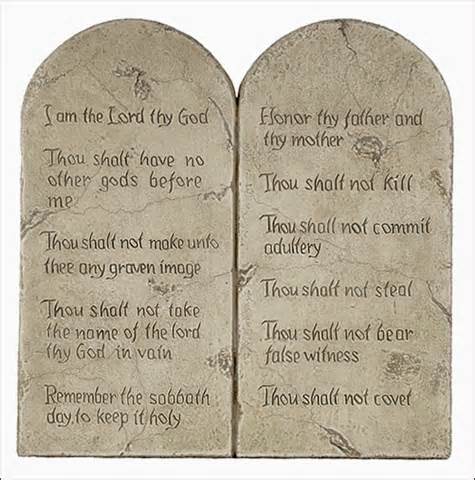
The ORIGINAL Ten Commandments
Well, I don't really like the second set of Ten Commandments. Usually, if someone -- such as GOD -- says that this second set should replace the first set, you listen to him. But we humans, thankfully, preferred the first set.
So, just what are the commonly accepted Ten Commandments?
The Ten Commandments -- Exodus 20 (King James Version - unedited)
1. Thou shalt have no other gods before me.
2. Thou shalt not make unto thee any graven image, or any likeness of any thing that is in heaven above, or that is in the earth beneath, or that is in the water under the earth. Thou shalt not bow down thyself to them, nor serve them: for I the LORD thy God am a jealous God, visiting the iniquity of the fathers upon the children unto the third and fourth generation of them that hate me; and shewing mercy unto thousands of them that love me, and keep my commandments.
3. Thou shalt not take the name of the LORD thy God in vain; for the LORD will not hold him guiltless that taketh his name in vain.
4. Remember the sabbath day, to keep it holy. Six days shalt thou labour, and do all thy work: But the seventh day is the sabbath of the LORD thy God: in it thou shalt not do any work, thou, nor thy son, nor thy daughter, thy manservant, nor thy maidservant, nor thy cattle, nor thy stranger that is within thy gates: For in six days the LORD made heaven and earth, the sea, and all that in them is, and rested the seventh day: wherefore the LORD blessed the sabbath day, and hallowed it.
5. Honour thy father and thy mother: that thy days may be long upon the land which the LORD thy God giveth thee.
6. Thou shalt not kill.
7. Thou shalt not commit adultery.
8. Thou shalt not steal.
9. Thou shalt not bear false witness against thy neighbour.
10. Thou shalt not covet thy neighbour's house, thou shalt not covet thy neighbour's wife, nor his manservant, nor his maidservant, nor his ox, nor his ass, nor any thing that is thy neighbour's.
And all the people saw the thunderings, and the lightnings, and the noise of the trumpet, and the mountain smoking: and when the people saw it, they removed, and stood afar off.”
[I added this last verse 18 just because I thought it sounded cool.]
The Catholic's Version
The Catholics thought these were too long and not catchy enough, so they came up with their own version.
http://www.vatican.va/archive/ccc_css/archive/catechism/command.htm
THE TEN COMMANDMENTS
1. I am the LORD your God: you shall not have strange Gods before me.
2. You shall not take the name of the LORD your God in vain.
3. Remember to keep holy the LORD'S Day.
4. Honor your father and your mother.
5. You shall not kill.
6. You shall not commit adultery.
7. You shall not steal.
8. You shall not bear false witness against your neighbor.
9. You shall not covet your neighbor's wife.
10. You shall not covet your neighbor's goods.

The Problem With These Commandments
Let's discuss these individually and let's explore why it just seems like many of them could've been better written.
1. I am the LORD your God: you shall not have strange Gods before me.
2. You shall not take the name of the LORD your God in vain.
The first two are mildly redundant and could be combined to say something like, "Revere or respect the Lord."
3. Remember to keep holy the LORD'S Day.
It is now perfectly acceptable for people to work and play on Sunday. Thus, at just the third commandment, we have the majority of people in this world ignoring them. God, being… well, God… should've foreseen this happening in the future.
4. Honor your father and your mother.
With so many out-of-wedlock children and with so many children with divorced or estranged parents, this is difficult to absolutely and completely embrace. Plus, there are a LOT of abusive and negligent parents in this world. They should NOT be honored.
Moreover, the whole part about "visiting the iniquity of the fathers upon the children unto the third and fourth generation of them that hate me" is very disturbing. If I had a drunken, wife-beating, child-abusing great-great-grandfather whom my father has never met, God would punish ME?
5. You shall not kill.
This is a good one. I won't discuss war or capital punishment or the Crusades. People, when acting for and of themselves, know they should not kill. Keep this one.
6. You shall not commit adultery.
9. You shall not covet your neighbor's wife.
Mildly redundant. Unless! You treat the covet thing as you would in #10, which then makes the wife more like property. Sure, it was more acceptable at that time, but God should've known that eventually women wouldn't be treated as property.
7. You shall not steal.
8. You shall not bear false witness against your neighbor.
Stealing and lying. Two bad things. Keep those. However, why do I have to infer that this should be extended beyond my neighbor?
10. You shall not covet your neighbor's goods.
My neighbor has a $35,000 SUV. I'm kind of breaking the tenth commandment when I wave to him from my 20-year old beater. There should be no "kind of" when it comes to Commandments given by God.
--------------------------------------
See? The Ten Commandments are not all that influential.
- Most people ignore at least a few of them.
- We must infer.
- We must extend or modify the meaning to our modern age.
- They are not principles people use to guide their lives, their thoughts, and their actions. Some of them, maybe, but not all.
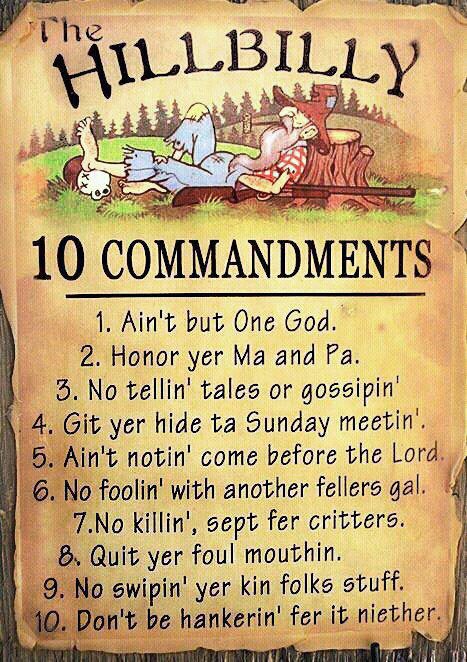
People Ignore Them but Say They Don't
Instead, the Ten Commandments are now mostly a SYMBOL of religion.
I hear people say they abide by the Ten Commandments. I bet most of these people couldn't list all ten. So when they say they abide by the Ten Commandments, what they really mean is that they live a moral and just life, they don't hurt anyone, and they don't hurt themselves; or something to that effect.
In other words, what they're saying is that they live by a set of rules and principles that are specifically NOT the same as the Ten Commandments, but something the Ten Commandments indirectly and in a round-about way represent in their own minds. This is but one reason why these Ten Commandments are having such a difficult time being universally accepted.
If they were consistent in the Bible, if they withstood the test of time, if they didn't invite personal modifications, and if everyone could live by their principles easily and naturally, then I believe they wouldn't be so controversial. I believe there would exist other causes that would capture peoples' attention and debate.
Ten Commandments that would stand the Test of Time
So, if neither of the Bible's two versions of the Ten Commandments are universally applied and followed by God's people, what should they be?
I happened upon a Native American gift shop where I saw a poster entitled, "The Ten Indian Commandments." When I read these I instantly thought, "THESE are what the Ten Commandments should've been!"
I suggest that as you read each one, dwell on it a moment. Think about it - even meditate on it if you're so inclined. Consider how your life would be if you used and applied each one to your daily grind. And then, extend this to humanity as a whole. What would the world be like if each of these were used as guiding principles?
Without further ado:
THE TEN INDIAN COMMANDMENTS
1. Treat the Earth and all that dwell thereon with respect.
2. Remain close to the Great Spirit.
3. Show great respect for your fellow beings.
4. Work together for the benefit of all mankind.
5. Give assistance and kindness wherever needed.
6. Do what you know to be right.
7. Look after the well-being of mind and body.
8. Dedicate a share of your efforts to the greater good.
9. Be truthful and honest at all times.
10. Take full responsibility for your actions.
Finally, universal truths and guiding principles that all people can follow, no matter their culture, their religion, or their social standing. If these were the Ten Commandments, there would be no fighting over posting them in publicly-funded institutions. People would simply nod their heads in agreement.

These Have Earned a Worthy Discussion
Let's briefly consider the impact of each one:
1. Treat the Earth and all that dwell thereon with respect.
The environmentalists and PETA would agree with this. And yet, many believe it is not disrespectful to use the coal and the oil that the Earth provides. We just have to ensure safeguards and mechanisms are put in place that would allow their use without damaging other echosystems.
The sadness of the loss of the buffalo in the western plains is a reminder that we humans failed. And yet, we must appreciate nature's cycle. For example, some people are against killing wolves or deer. But if left unchecked, they would cause unbalance - the wolves would then decimate the smaller animal population and the deer would cause havoc (and disease) in and near populated areas.
The use of the word RESPECT causes one to consider the bigger picture and not be guided by a narrow focus. Dwelling on this first commandment should give many great insight into the balance of nature, Earth, and man.
2. Remain close to the Great Spirit.
This kind of covers the first three of the Bible's commandments:
1. I am the LORD your God: you shall not have strange Gods before me.
2. You shall not take the name of the LORD your God in vain.
3. Remember to keep holy the LORD'S Day.
I believe, however, that the third commandment's true intent of keeping holy the Lord's day, had God had the foresight to see mankind today, is to remain close to the Great Spirit.
Remaining close to the Great Spirit requires prayer, meditation, and reflection. It honors the Catholic reminder that God is always watching. And the term "Great Spirit" is universal, so there won't be all that arguing about the name God, or Allah, or whatever.
3. Show great respect for your fellow beings.
4. Work together for the benefit of all mankind.
These two cover the remaining commandments of the Bible: honor your parents, you shall not kill, commit adultery, steal, bear false witness, covet neighbor’s wife or neighbor’s good.
But in their being non-specific, should people live by these two principles, there would be no crime and killing. Socialist countries are satiated. The Middle East wouldn’t kill over a cartoon. I could go on and on.
5. Give assistance and kindness wherever needed.
So, instead of people depending on the government, which is almost universally fraught with waste and corruption and undue influence by money, PEOPLE would take care of people. This includes the small things such as holding the door for someone, all the way to helping a country ravaged by an earthquake.
6. Do what you know to be right.
This, too, covers the commandments pertaining to honor, murder, adultery, and so on. But it also requires people to reflect, to listen to their intuition, to question their actions. Often, people justify certain wrongful behaviors by quoting scripture (and not just the Bible). Just to give one example; I’m sure that, even though stoning for being raped is approved of in some writings, if people did what they knew to be right, those women would still be alive.
7. Look after the well-being of mind and body.
This goes without saying, so consider another view: Imagine what our health care costs and the burden on government if people would just take care of themselves both mentally and physically. Health care is bankrupting civilized societies. If government were freed up to do other things, peoples’ standards of living would be raised across the board. Moreover, there are many individuals, many families, that are burdened by having to take care of a loved one that abused themselves in one way or another. This “burden” is usually done happily and lovingly, but it is still a burden, nonetheless.
8. Dedicate a share of your efforts to the greater good.
Again, this is NOT to be done by government. Individuals, adults, children – to do this would learn selflessness. They would learn to look up once in a while from their electronic device and actually make an effort for someone else that doesn’t necessarily benefit only themselves. What a refreshing world that would be!
9. Be truthful and honest at all times.
How is this not one of God’s original Ten Commandments?
10. Take full responsibility for your actions.
What a difference on society this would make if people can no longer blame someone else for their doings, for their problems. Yes, I know that many have no control over bad things that happen to them. This does not pertain to them. For those that DO have control, please heed this all-important commandment: Take full responsibility for your actions.
Taking this to heart
What are the chances that our religions would agree that maybe the Bible, or God or Moses or whomever, made a mistake, that there truly was some confusion when the Ten Commandments were created, and thus, instead of pushing the accepted version of the Ten Commandments, they would push these improved commandments instead?
Mankind would benefit. But the churches would have to admit a mistake.
Benefit to Mankind -or- keep things as they are?
It's sad to say, but I have a feeling the churches aren't going to do what's best.
Sigh...
And so, I ask everyone just one more time, to read and reflect on each of these Ten Indian Commandments:
